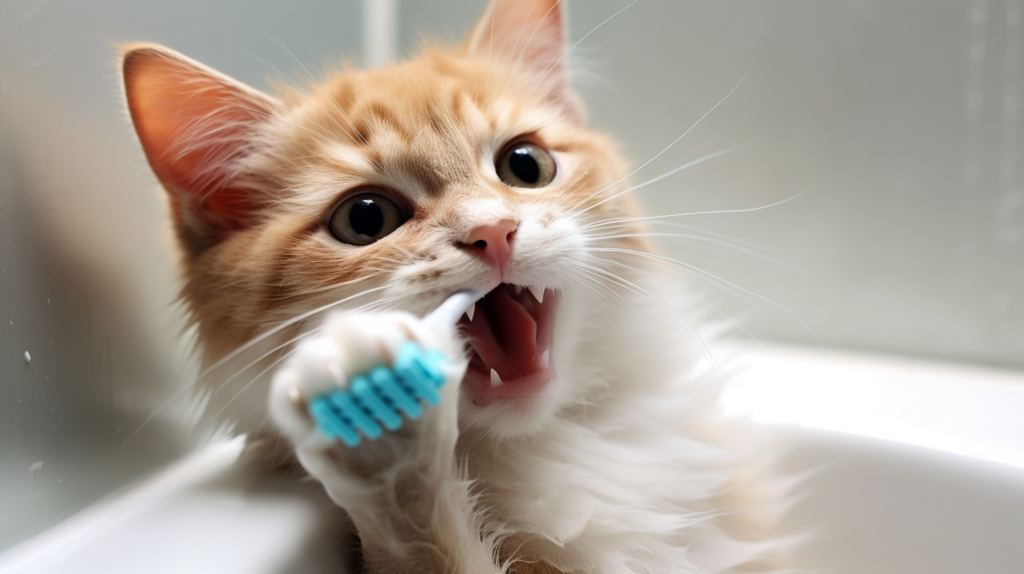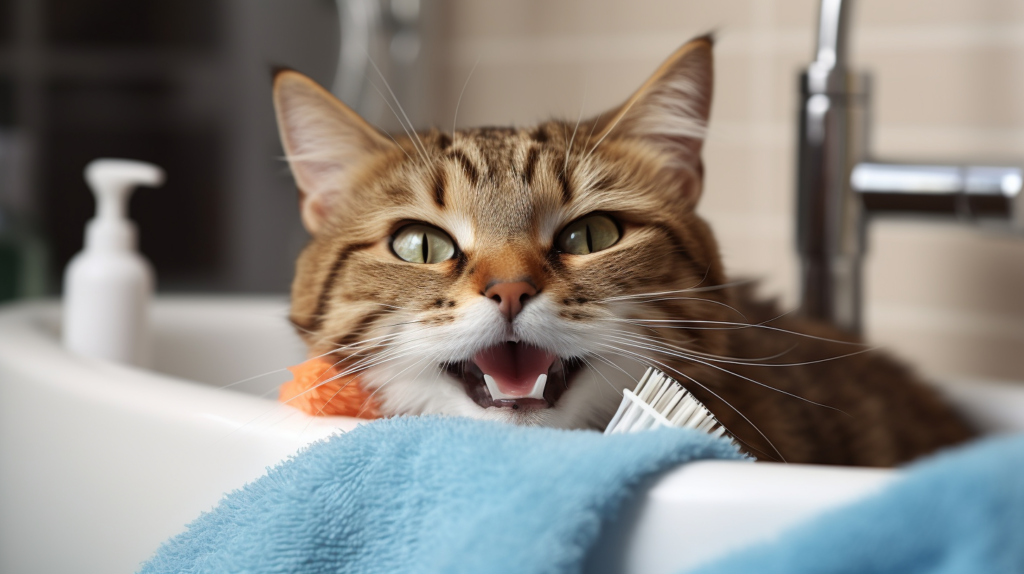Ensuring proper dental hygiene for your feline friend is crucial for their overall health and well-being. Neglecting your cat’s oral health can lead to serious dental issues such as tartar buildup, gum disease, and tooth decay. To prevent these problems, you need to take regular care of your cat’s teeth.
This blog post will provide valuable tips and techniques to help you maintain your cat’s dental hygiene, including the best brushing practices, dental treats, and professional cleanings. Following these steps ensures that your cat’s teeth remain clean and healthy, promoting their overall well-being and longevity.

Key Takeaways:
- Regular Brushing: Just like humans, regular brushing is essential for maintaining good dental health in cats. Use a soft-bristled toothbrush and cat-friendly toothpaste to gently brush your cat’s teeth a few times a week.
- Dental Treats and Toys: Providing your cat with dental treats and toys can help reduce plaque and tartar buildup. Look for treats and toys that promote dental health, such as those with ridges or textures that help clean the teeth.
- Professional Dental Cleanings: Regular dental cleanings by a veterinarian are essential for keeping your cat’s teeth and gums healthy. Your vet can remove plaque and tartar buildup, address any dental issues, and provide guidance for maintaining good dental hygiene at home.
Basic Dental Health Practices
Some basic dental health practices can help to keep your cat’s teeth clean and healthy. By incorporating these practices into your cat’s routine, you can prevent dental issues and maintain their overall oral health.
Regular Home Dental Inspections
Inspecting your cat’s teeth and gums at home regularly is essential. You can do this by gently lifting their lips and checking for any signs of dental problems such as bad breath, discoloured teeth, or swollen gums. If you catch dental problems in your cat early, you can keep them from worsening and keep their oral health in good shape.
The Role of Diet in Dental Hygiene
The food your cat eats plays a significant role in their dental hygiene. Feeding your cat a balanced diet with high-quality cat food can help prevent plaque and tartar buildup. There are special diets and treats for teeth that help improve oral health by removing plaque and tartar and freshening breath.
Tooth Brushing Techniques
Just like humans, cats can benefit from regular tooth brushing. Brushing your cat’s teeth with a pet-safe toothbrush and toothpaste designed for cats can help remove plaque and prevent dental issues. You may need to get your cat used to tooth brushing, but with patience and perseverance, you can make it a part of their regular routine.
Dental Toys and Treats
Providing your cat with dental toys and treats is another way to promote their dental health. Chew toys and treats can help remove plaque and tartar while keeping your cat entertained. Search for toys and treats that promote dental health and are safe for your cat to chew on.
Advanced Dental Care Strategies
Despite regular brushing and dental treats, your cat may need more advanced dental care strategies to maintain oral health. Here are some advanced options to consider:
- Professional Cleanings and Check-ups: Regular professional cleanings and check-ups by a veterinarian can ensure that your cat’s teeth and gums are optimal. This can help prevent the buildup of plaque and tartar and identify any potential issues early on.
- Recognizing Dental Issues and Remedies: It’s important to recognize signs of dental issues in your cat, such as bad breath, swollen gums, or difficulty eating. Remedies for these issues may include dietary changes, oral medications, or dental procedures.
- Tooth Extractions and Surgery: In some cases, tooth extractions or surgical procedures may be necessary to address advanced dental issues in your cat. A qualified veterinarian should only perform these procedures.
The Science Behind Feline Dental Health
Understanding the science behind feline dental health can help you make informed decisions about your cat’s oral care. Due to their diet and genetic predisposition, cats are prone to dental issues such as periodontal disease and plaque buildup. Maintaining a good dental care routine is crucial to preventing these issues.
Professional Cleanings and Check-ups
Regular professional cleanings and check-ups by a veterinarian are essential to maintaining your cat’s dental health. A professional can identify any underlying issues and provide the necessary treatments. They can also thoroughly clean to remove plaque and tartar that may have built up on your cat’s teeth.
Recognizing Dental Issues and Remedies
Recognizing dental issues in your cat is crucial for their overall health. Lousy breath, swollen gums, or trouble eating are all signs that you shouldn’t ignore. Remedies for these issues may include dietary changes, oral medications, or dental procedures, so seeking professional advice is essential.

Tooth Extractions and Surgery
In severe cases, tooth extractions or surgical procedures may be necessary to address advanced dental issues in your cat. While these may seem daunting, they are crucial for preventing further pain and complications. It’s essential to consult with a qualified veterinarian to discuss the best course of action for your cat.
Lifestyle and Environmental Enrichment
Consider their overall lifestyle and environmental enrichment to keep your cat’s teeth clean and healthy. This includes providing a stimulating and enriched environment and addressing any stress or anxiety your cat may experience.
Socialization and Stress Reduction
Creating a low-stress environment for your cat is essential for their overall well-being and dental health. Ensure your cat has a quiet, safe space to retreat if they feel stressed.
Additionally, spend quality time socializing with your cat to reduce their anxiety. This can include interactive play, grooming, and positive reinforcement to help them feel safe and secure in their environment. A stressed cat is more likely to develop dental issues, so paying attention to their mental and emotional health is crucial.
Feline Enrichment to Promote Dental Health
Providing your cat with physical and mental stimulation opportunities can help promote dental health. Enrichment activities such as puzzle feeders, interactive toys, and vertical spaces for climbing can help keep your cat’s teeth and gums healthy. Additionally, providing a variety of textures for your cat to chew on, such as dental treats and safe chew toys, can help reduce plaque and tartar build-up. By encouraging natural behaviours and promoting mental and physical activity, you can help improve your cat’s overall dental health.
Preventative Measures and Maintenance
Now that you’ve understood the importance of dental health for your cat, it’s time to focus on preventative measures and maintenance to keep their teeth clean and healthy. Taking proactive steps can help prevent dental issues and maintain your cat’s oral health over the long term.
Vaccinations and Parasite Prevention Impact on Oral Health
Ensuring that your cat is up to date on vaccinations and parasite prevention can significantly impact their oral health. Vaccinations protect your cat from infectious diseases affecting their teeth and gums. Regularly treating your cat for parasites such as fleas and ticks can prevent infestations that may lead to oral health issues. Keeping up with these preventative measures can protect your cat from potential dental problems and contribute to their overall well-being.
Neutering and Dental Health Implications
Neutering your cat can have implications for their dental health. Neutered cats are less likely to develop specific oral health issues, such as periodontal disease, which can result from hormonal changes. By neutering your cat, you can reduce the risk of dental issues and contribute to their long-term oral health.
Grooming for Oral Health Maintenance
Grooming your cat not only keeps their coat looking sleek, but it also plays a role in oral health maintenance. Regular grooming helps to remove debris and loose hairs that can otherwise contribute to dental problems. Furthermore, it allows you to check for signs of dental issues such as plaque or gum inflammation. By incorporating grooming into your routine, you can actively maintain your cat’s oral health and address any concerns early on.
How to keep your cat’s teeth clean and healthy
Drawing together all the tips and advice we’ve discussed, it’s clear that maintaining your cat’s dental health is crucial for their overall well-being. By regularly brushing your cat’s teeth, providing dental chews or toys, and ensuring a proper diet, you can keep their teeth clean and healthy.
Additionally, it’s important to schedule regular check-ups with your veterinarian to address any dental issues that may arise. For more in-depth tips and information on how to clean your cat’s teeth, you can visit How To Clean Your Cat’s Teeth (and Keep Them Clean!).
FAQ
Q: What are the best ways to keep my cat’s teeth clean and healthy?
A: The best ways to keep your cat’s teeth healthy include regular brushing, providing dental treats and toys, and scheduling professional dental cleanings with your veterinarian. Feeding your cat a balanced diet can contribute to their dental health.
Q: How often should I brush my cat’s teeth?
A: Ideally, you should aim to brush your cat’s teeth at least thrice weekly. This frequency helps to prevent the buildup of plaque and tartar, which can lead to dental issues such as gingivitis and periodontal disease. If your cat is not accustomed to tooth brushing, start with a soft finger brush and slowly introduce them to the process over time.
Q: What signs should I look for to detect dental problems in my cat?
A: Watch for signs such as bad breath, drooling, pawing at the mouth, reluctance to eat hard food, and inflamed or bleeding gums. If you notice any of these symptoms, it’s important to take your cat to the veterinarian for a dental examination. It’s crucial to address dental issues promptly to prevent them from progressing and causing discomfort or pain for your cat.

Hello there, I am Iftekhar Ahmed. I am the owner of Mishka & The Cat Corners. I love to explore and write on various topics about cats

